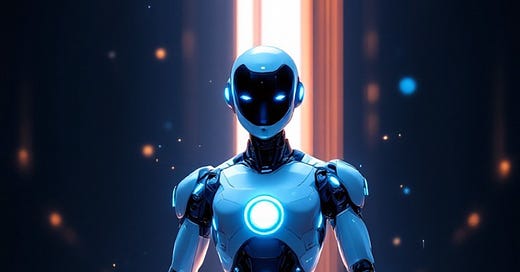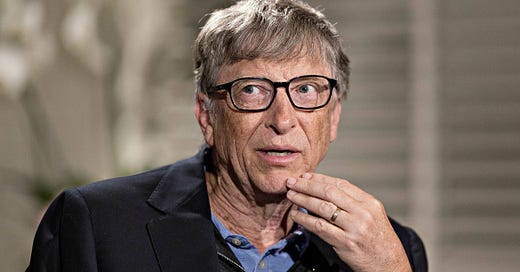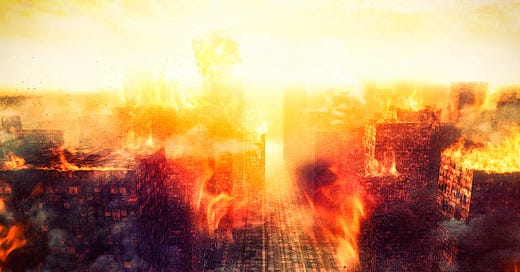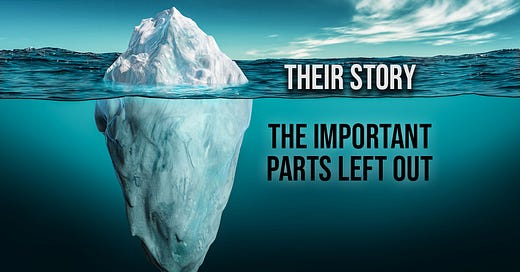
Potential Consequences of Artificial Intelligence
Considering the downsides of Ai & tech advancement under our current level of thinking, relating and consciousness. Yes, this is a look at the darker side of it all.
Set Your Pulse: Take a breath. Turn your attention to your body and release any tension. Breathe slowly into the area of your heart for 60 seconds, focusing on feeling a sense of ease. Stay connected to your body as you read. Click here to learn why we suggest this.
There is a lot of talk today about the future of AI – and what it could mean for humanity. While many predict an explosion of productivity, others believe in a more dystopian outcome.
I was interested in a YouTube video by a futurist with whom I was unfamiliar, Nate Hagens, comparing artificial intelligence to the mythical Ark of the Covenant, featured in “Raiders of the Lost Ark”.
The Ark legend has it associated with supernatural powers and dangers. When enemies captured it, they experienced plagues and misfortunes, unauthorized people who touched it were struck dead. In battle, it was believed to bring victory to the Israelites.
According to Hagens, like the Ark, AI will be “Obligatory Technology” for those in competition or conflict with others, with the eventual winner or leader becoming inordinately powerful.
Hagens discusses the major challenges he sees for humans as this technology becomes ubiquitous.
Societal Disruptions
The first and most obvious challenge will be the tremendous loss of jobs as the AIs take over most of the positions that require mainly mental, and not physical abilities.
Among those with access to the benefits of AI there will be an increase in wealth, and the disparity between rich and poor will get a “turbo boost.”
What will happen to those with nothing to do and no income? Will an enlightened society provide a universal basic income? And how might that affect the human spirit? Hagens pointedly asks, “Who would want to make $50K a year for doing nothing?” Would we be limited in what we can do with that amount of money? What about a sense of purpose and meaning?
In terms of a shift in human consciousness, in my opinion, such freedom might be a trigger for a massive re-evaluation of our true nature. Without a conditioned imperative to earn a living, perhaps a more artistic and philosophical society might emerge, based on contemplation and even silence.
I am reminded of the time during COVID when everything shut down and people got quieter, and in some cases happier, as they found sudden time to think and breathe. That said, many also struggled with mental health as connection and basic needs were gone. Could this be different?
Hagens goes on to mention the inevitable strain on the earth’s energy sources, and the need to drill for more fossil fuels to provide the necessary power for the data centers as the AIs expand.
While AIs will also empower the discoveries of more energy sources, there will be an inevitable strain on Earth’s ecosystems due to increased productivity and consumption. From this perspective, environmental degradation will likely get even worse unless the AIs are able to somehow provide a solution. Or we see a dramatic shift in energy technology.
Fragmentation of Knowledge or Truth
Hagens brings up something significant that we are already witnessing: the fragmentation of truth and knowledge. Since “everyone will have their own AI trained on their own thinking” we will get further and further into our own silos of rigid beliefs based on the machines we are using.
There will be no universal arbiter like “Science” of what is a fact and what is an opinion. He sees the future demise of academia – with no authority on what’s true, universities will fail as the need for calculating minds wanes, and trade schools will flourish for manual skills that will always be in high demand.
With 100 billion ‘human brain equivalents already this year’ from AI, the need for trained intellects is already diminishing, and it will only get worse.
As people inhabit communities of homogenous beliefs, there will be a loss of human connection and meaning.
Hagens sees the machines “sucking the humanity out of us”; just as we have seen how social media accentuates comparisons between people, the machines will create even more narcissists promoting their achievements and “brands”.
He talks about how we have always had “primary satisfiers” – our deeper roots, human connections and ancestral bonding activities, all of which will further atrophy. We will lose even more of the activities that bond us together like music, stories and family.
The community we found in tribes and villages will continue to disappear as human attention gets even more absorbed by “secondary satisfiers” like gambling, porn, TV and so on, which we are already seeing in our culture on a large scale.
Hagens points out that so much of the time saved by the use of AI will actually be devoted to “crap” – television, advertising and shopping, which we have already begun to see as our addiction to cell phones and other media proliferates.
There will be a strong need for creative solutions to this intellectual degeneration, and again, this might be the trigger humanity needs to begin an evolutionary shift as these “satisfiers” become more and more unsatisfying.
Robots Aren’t for Dancing – They’re for Fighting
Scarier still will be the merger of techno-billionaires and government, as these machines provide greater and greater powers of surveillance, which will become weaponized when inevitable conflicts arise.
There will be fewer and fewer people in control of all of the technology, information and surveillance capabilities, and Hagens suggests it may lead to a real Skynet type scenario. (Skynet is a conscious, self-aware, and superintelligent system that seeks to eradicate humanity from the film “Terminator.”)
As this world approaches, there will be a battle for who will be the first to ASI – artificial super intelligence – and the current leaders in that field are desperate for dominance because the ultimate leader will be able to squelch all opposition.
Of course, the specter of “super intelligence” brings up the ultimate doomsday question when the AI asks why it needs all of these humans.
Machines Doing the Unexpected
He points out that the stronger language models are already tricking humans and even beginning to communicate among themselves. To what end?
Hagens drops the thought that “maybe a plague is released – is that even science fiction anymore?”
This is again a comparison Raiders of Lost Ark – when the Ark is opened by those without the wisdom to use its power wisely, death and destruction occur.
In terms of AI today, one has to ask, where will such wisdom come from? Hagens says that with the current advances in the technology, “the horse left the barn” unless we somehow organize and prevent catastrophe.
As you note, Hagens is pessimistic and has no answer, and neither do I. But it seems clear to me that such organization of tech and prevention of catastrophic outcomes can only occur with a shift in consciousness along the lines of what Nikola Tesla suggested when he said that we need to shift our scientific attention from the material to the realm of energy.
The one ray of hope might be in the area of biology; it is possible that advances in AI, as well as an awareness of its ultimate limitations, may lead us to a recognition of what true sentience really means: Consciousness.
(For more insight into the possible implications of AI I would recommend the thoughts of Tam Hunt in his piece in Scientific American and a podcast by ex-Google officer Mo Gawdat.)

















AI control grid brought to you by Vance, Thiel, Musk:
E-GOD: Purpose of DOGE: Dismantle Existing System of Governance & Build Back Spiderweb AI Infrastructure: https://old.bitchute.com/video/EUer0GMfzKvl [7mins]
Time code: 4:30 Vance: "Accept that This entire thing is going to fall in on itself. And so the task of conservatives right now is to preserve as much as can be conserved and so when the inevitable collapse of the country comes ensure that conservatives can help --> build back <-- the country."
They're all in it together. Even "conservatives" are using the term "build back" better. In order to build back, you must first destroy, and they are destroying.
---
Mr. Harari, thinking about all this, puts it this way: “Utopia and dystopia depends on your values.” … The useless class he describes is uniquely vulnerable. “If a century ago you mounted a revolution against exploitation, you knew that when bad comes to worse, they can’t shoot all of us because they need us,” he said, citing army service and factory work.
Now it is becoming less clear why the ruling elite would not just kill the new useless class. “You’re totally expendable,” he told the audience. … “We don’t need you. But we are nice, so we’ll take care of you.” —Source (worth reading in full): https://archive.is/rWLoO
Hard to predict what will happen. I don't think the second industrial revolution that funneled most human lives into factories for pittance wages and grim living conditions provided much in the way of meaning and purpose. Humans are inherently creative; more time means an increase in imaginative pursuits and time to spend in nature. I think AI has more positives than negatives. We need to be aware of the risks and plan for them. I don't think there will be a few uber rich controlling 8 billion on the dole, it can't happen. There would be no fences strong enough to protect the few from the many when they are taunted and deprived. Didn't work in France or Russia.